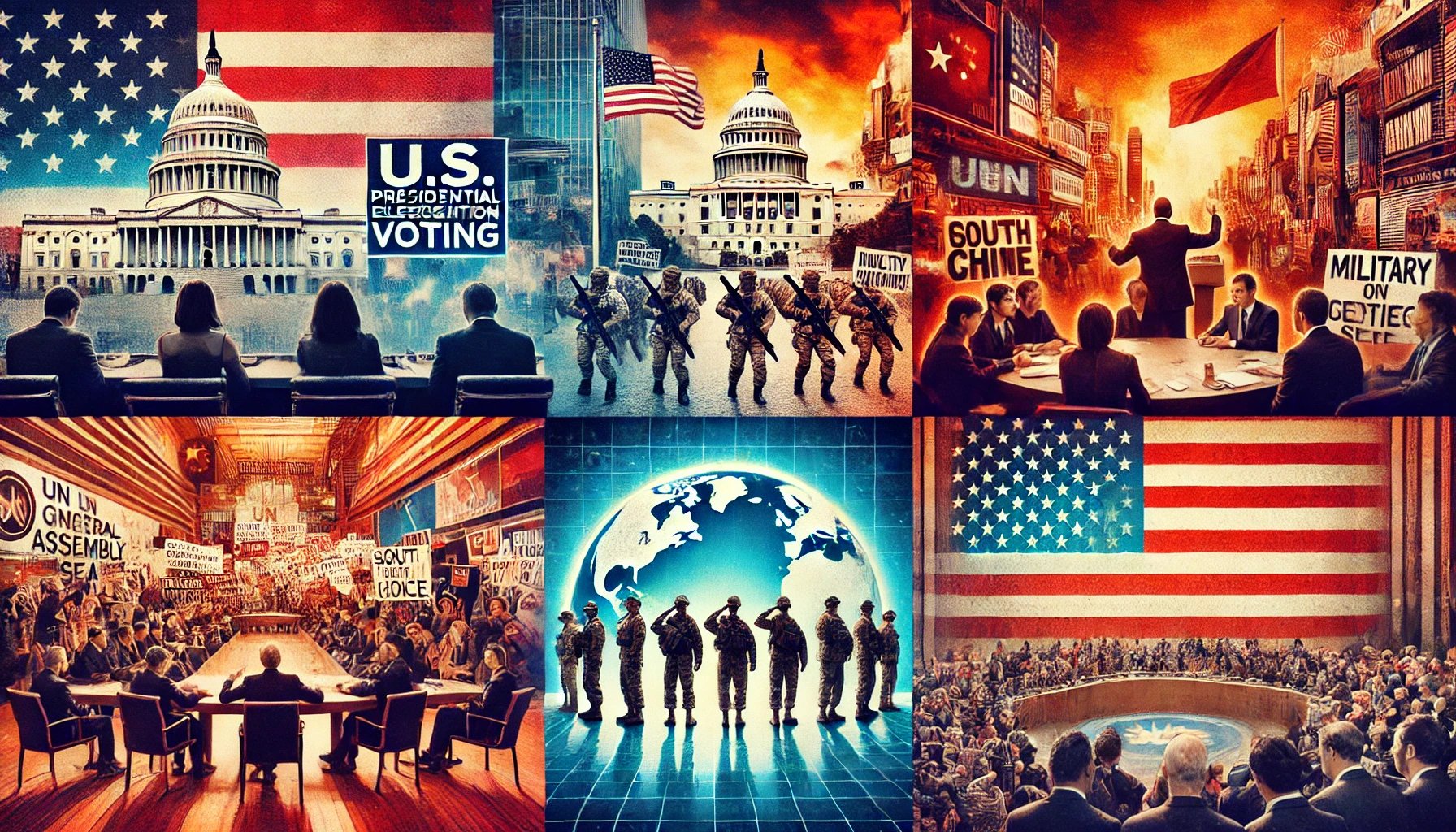In 2024, the global political landscape was marked by significant events that reshaped nations and influenced international relations. Below is a detailed overview of 30 notable political developments from around the world:
- United States Presidential Election: On November 5, 2024, Donald Trump was re-elected as President, defeating incumbent Vice President Kamala Harris. This victory marked Trump’s return to the White House for a non-consecutive second term, a feat last achieved by Grover Cleveland in 1892. Business Insider
- Republican Control of U.S. Government: In addition to the presidency, the Republican Party secured majorities in both the Senate and the House of Representatives, granting them comprehensive control over the federal government. This consolidation of power is expected to facilitate the implementation of conservative policies across various sectors. Them
- Brazilian Police Recommend Charges Against Jair Bolsonaro: Brazilian authorities recommended criminal charges against former President Jair Bolsonaro and 37 others for their alleged involvement in a coup plot following his 2022 electoral defeat. The investigation focuses on events leading up to the January 8, 2023, riots in Brasília. Financial Times
- Ireland’s General Election and Sinn Féin’s Surge: In Ireland’s general election, Sinn Féin experienced a notable increase in support, rising by 2 percentage points to 18%. This surge positions the party as a significant player in forming the next government. The Times
- Queensland Labor’s Electoral Defeat: The Queensland Labor Party faced a significant defeat in the state election, prompting an in-depth review to analyze the reasons behind their performance. The review is led by NSW Labor General Secretary Dom Ofner and South Australian Senator Karen Grogan. Courier Mail
- Donald Trump’s Cabinet Appointments: Following his re-election, President Trump announced key cabinet appointments, emphasizing loyalty and alignment with his “America First” agenda. Notable selections include Pam Bondi as Attorney General and Marco Rubio as Secretary of State. The Times
- Steve Bannon’s Return to Political Influence: After serving a prison sentence for contempt of Congress, Steve Bannon resumed his influential role in Trump’s political circle, advocating for mass mobilization efforts and supporting the administration’s populist agenda. New York Magazine
- FBI Raid on Polymarket CEO: The FBI raided the home of Polymarket CEO Shayne Coplan as part of a criminal probe into alleged illegal betting by U.S. users, violating a previous agreement with the government. The investigation centers on whether the site accepted illegal bets from U.S. users. New York Post
- COP29 Hosted by Azerbaijan: The 29th United Nations Climate Change Conference (COP29) was held in Baku, Azerbaijan. The choice of host sparked controversy due to Azerbaijan’s environmental and human rights record, leading to boycotts by activists and human rights organizations. Time
- Russian Invasion of Ukraine: The conflict between Russia and Ukraine continued, with significant military engagements and international diplomatic efforts aimed at resolving the crisis. The war has had profound implications for regional stability and global geopolitics.
- Myanmar Civil War: The civil war in Myanmar persisted, with various ethnic armed groups and the military junta engaged in ongoing conflict. The humanitarian situation remains dire, with widespread displacement and human rights violations reported.
- Sudanese Civil War: Sudan experienced continued internal conflict, with clashes between government forces and rebel groups. Efforts to broker peace have faced significant challenges, impacting the nation’s stability and development.
- Islamist Insurgency in the Sahel: The Sahel region faced escalating violence from Islamist insurgent groups, affecting countries like Mali, Niger, and Burkina Faso. International interventions have aimed to curb the insurgency and restore security.
- Israel–Hamas War and Regional Spillover: The conflict between Israel and Hamas intensified, leading to significant military operations and civilian casualties. The war’s effects spilled over into neighboring countries, notably Lebanon, where Israel conducted military operations against Hezbollah.
- Assassination of Hassan Nasrallah: Hassan Nasrallah, the Secretary-General of Hezbollah, was killed in a bombing of the group’s headquarters. The attack marked a significant development in the regional conflict involving Israel and Hezbollah.
- Assassination of Ismail Haniyeh: Ismail Haniyeh, the political leader of Hamas, was assassinated in Tehran, Iran. His death has implications for Hamas’s leadership and its relations with regional allies.
- Houthi Movement’s Activity in the Red Sea: The Houthi movement increased its activities in the Red Sea, contributing to a crisis that impacted global shipping routes and raised international security concerns.
- Global Protests Against the Israel–Hamas War: Widespread protests erupted globally in response to the Israel–Hamas conflict, with demonstrators calling for an end to hostilities and greater international intervention to protect civilians.
- Indian General Election: India conducted its general election, with over 900 million eligible voters participating. The election’s outcome has significant implications for the country’s domestic policies and international relations.
- European Parliament Elections: The European Union held elections for the European Parliament, with member states voting on representatives. The results will influence EU policies and its approach to global challenges.
- United Kingdom General Election: The UK held a general election on July 4, 2024. The election’s outcome will shape the country’s political landscape and its approach to post-Brexit challenges.
- French Legislative Elections: France held legislative elections with significant shifts in parliamentary representation. These results affected President Emmanuel Macron’s ability to push forward his agenda, with opposition parties gaining ground. Key debates centered on economic reform, immigration policy, and France’s role in the EU.
- China’s Growing Assertiveness in the Indo-Pacific: China continued to assert its territorial claims in the South China Sea and increased its military presence in the Taiwan Strait. These actions led to heightened tensions with neighboring countries and the U.S., resulting in a series of diplomatic exchanges and military drills.
- Japan’s Constitutional Reform Debate: Japan advanced discussions on revising its pacifist constitution, particularly Article 9, to allow for greater military capabilities. This move was driven by growing regional threats, particularly from North Korea and China.
- North Korea’s Missile Tests: North Korea conducted multiple missile tests throughout 2024, including intercontinental ballistic missiles. These actions heightened regional tensions and led to increased sanctions and diplomatic pressure from the international community.
- Iran’s Nuclear Program and Tensions: Iran’s nuclear program continued to be a flashpoint in international politics. Efforts to revive the Joint Comprehensive Plan of Action (JCPOA) stalled, and tensions between Iran and Western nations escalated, particularly with the U.S. and Israel.
- Pakistan’s Political Crisis: Pakistan faced political turmoil as former Prime Minister Imran Khan remained at the center of a polarized political landscape. Protests and clashes between Khan’s supporters and government forces highlighted deep divisions in the country.
- African Union’s Role in Regional Conflicts: The African Union increased its efforts to mediate conflicts in Ethiopia, Sudan, and the Sahel region. Despite limited success, the organization’s role in promoting peace and stability became increasingly prominent.
- UN General Assembly’s Focus on Global Crises: The 2024 UN General Assembly prioritized discussions on climate change, global health, and conflict resolution. Notable agreements included commitments to accelerate the transition to renewable energy and increase funding for pandemic preparedness.
- Turkey’s Economic Reforms: Under President Recep Tayyip Erdoğan, Turkey launched significant economic reforms to address inflation and stabilize its currency. These measures included raising interest rates and increasing foreign investment to rebuild economic confidence.


